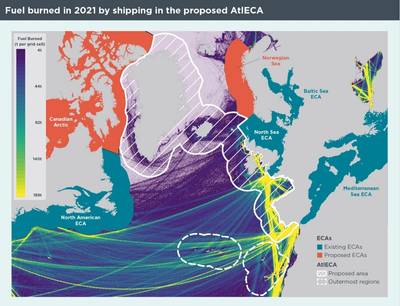Call for North Atlantic Ocean ECA
Recent research into the impact of an Emissions Control Area (ECA) in the North Atlantic Ocean confirms that there would be significant emissions reductions benefits if such an area were to be established, says environmental organization Opportunity Green.
The North Atlantic Emissions Control Area would mean stricter regulations on ships in designated areas, aimed at reducing and controlling their emissions of SOx, fine particulate matter (PM2.5), and NOx.
The International Council on Clean Transportation (ICCT) study compared the proposed ECA to a scenario without ECA regulations and found that, dependent on the dominant method used to comply with the regulations, this ECA could lead to 82% reduction in SOx emissions, 64% reduction in PM2.5 and 36% reduction in black carbon (BC) emissions.
If adopted, the proposed North Atlantic Emissions Control Area could be the world’s largest ECA, covering waters as far north as Greenland to as far south as Spain. Based on this analysis, the ICCT has recommended that the Atlantic ECA member states should include the full exclusive economic zones of Spain, Portugal, France, the United Kingdom, Ireland, Iceland, Faroe Islands, and Greenland in the geographic scope of the AtlECA. This would strategically connect the surrounding established or proposed ECAs, creating the largest low-emission shipping zone in the world.
An ECA currently exists in UK waters to the east and south in the English Channel and the North Sea, in which a sulfur cap of 0.1% and a NOx limit for newbuild ships (built after 2021) apply.
In March this year, Opportunity Green, along with Transport & Environment, Green Alliance, the Nature and Biodiversity Conservation Union (NABU), Fundación Ecología y Desarrollo ECODES, ZERO, and the Clean Arctic Alliance, called on the UK government to extend the North Sea and English Channel ECA in UK waters.
As well as extending the ECA to all UK waters, the NGOs urged UK government to collaborate with neighboring coastal states to establish an ECA beyond UK waters. If expanded in this way, it would enable to UK to link up into the proposed North Atlantic ECA.
Lord Deben, former Chair of the UK’s Climate Change Committee, says: “This study is a key piece of evidence that countries have been waiting for, and its message is unequivocal – a North Atlantic ECA would lead to impressive emissions reductions. This is an especially important topic for the new UK government as UK waters experience heavy shipping traffic and are in the top three most-polluted North-Atlantic coastal states.”














